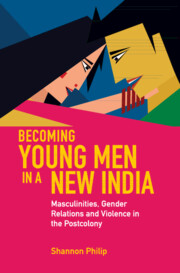Book contents
- Frontmatter
- Contents
- List of Figures
- Note on Terms and Translations
- Acknowledgements
- Introduction: Young Men in a Neoliberal India
- 1 Becoming a ‘New’ Indian Man
- 2 Making Masculine Bodies
- 3 Desexing Men and Hypersexing Women
- 4 Urbanisation and the Gendering of a Smart City
- 5 Men’s Violence and Women’s Safety
- Conclusion: Fragilities of a New Indian Man
- Appendix: Urban Smart Striver Profiles
- References
- Index
Conclusion: Fragilities of a New Indian Man
Published online by Cambridge University Press: 31 March 2022
- Frontmatter
- Contents
- List of Figures
- Note on Terms and Translations
- Acknowledgements
- Introduction: Young Men in a Neoliberal India
- 1 Becoming a ‘New’ Indian Man
- 2 Making Masculine Bodies
- 3 Desexing Men and Hypersexing Women
- 4 Urbanisation and the Gendering of a Smart City
- 5 Men’s Violence and Women’s Safety
- Conclusion: Fragilities of a New Indian Man
- Appendix: Urban Smart Striver Profiles
- References
- Index
Summary
Becoming ‘New’ Indian Men
I began this book by highlighting the paradoxical position young men inhabit within the postcolonial Indian social order, where they are caught up between the seductive charms of a ‘new’ India but remain burdened with the demands of an ‘old’ India. They desire a life full of ‘freedom’ and ‘fun’, but cannot fully or always live this life because they are not free-floating agents. They are bound deeply within relationships of obligations and kinships networks that they cannot easily abandon. Indeed, many men do not wish to abandon ‘old’ India, for it continues to bring them much patriarchal dividend. Hence, it is in this dynamic tension that young men try their best to strike a balance and lead a life that they deem valuable. Young men create an inner social world of their own where they live and build a ‘good life’ that they value. It is in and through this inner social world, away from the authority of their families, that I have approached and probed the processes of becoming young men in a ‘new’ India.
The Urban Smart Strivers lead compartmentalised lives where, on the one hand, they try to appease their parents by appearing to be obedient sons who do not partake in the ‘taboo’ behaviours of drinking, smoking, sexual activities or parties and yet, on the other hand, these ‘taboo’ behaviours are extremely valuable and desirable practices within their cultures of urban youth masculinity, which are bolstered and encouraged by media forces and the changes to the urban leisure architecture as new ways of enjoying a ‘free’ life and ‘new’ thinking. It is through subterfuge and a careful management of the self that young men manage to participate in these pleasures of ‘new’ India. Within their inner homosocial worlds, young men dance, drink and smoke, meet girls, enjoy sexual and romantic relationships, shop, take selfies and enjoy what they deem being ‘free’ and ‘modern’. The forces of neoliberalism, which are highly malleable, also work around their social constraints, for example, through offering ‘afternoon parties’ for young people to enjoy without their parents finding out.
- Type
- Chapter
- Information
- Becoming Young Men in a New IndiaMasculinities, Gender Relations and Violence in the Postcolony, pp. 160 - 171Publisher: Cambridge University PressPrint publication year: 2022



